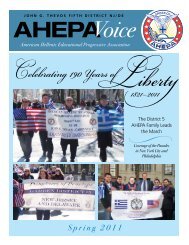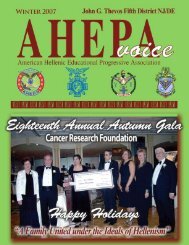AHEPA Voice Spring 2010 [PDF] - AHEPA District 5
AHEPA Voice Spring 2010 [PDF] - AHEPA District 5
AHEPA Voice Spring 2010 [PDF] - AHEPA District 5
Create successful ePaper yourself
Turn your PDF publications into a flip-book with our unique Google optimized e-Paper software.
Greek Independence Day Is Honored<br />
by Tri-Chapter Flag Raising<br />
Hackensack, NJ – March 25, <strong>2010</strong><br />
– Upwards of one hundred Greek Americans<br />
and Phil- Hellenes were on hand at the<br />
Bergen County Administration Building in<br />
Hackensack, NJ to commemorate Greek<br />
Independence Day. The program was put<br />
together by the Bergen County Executive,<br />
Dennis McNerney and his staff with the<br />
leadership of the 3 <strong>AHEPA</strong> chapters of<br />
Bergen County, Ramapo #453, Alexander<br />
Hamilton #54 and Bergen Knights #285.<br />
Each respective Chapter President Jim Giokas<br />
of #453, Dr Ted Constantelis<br />
of #54 and Stephen Ferrante<br />
of #285 made remarks as part<br />
of the program.<br />
The program also involved<br />
the Greek American Chamber<br />
of Commerce who honored<br />
Gus Vetsas, a local restaurateur<br />
in Hackensack. The clergy of<br />
the church communities of St<br />
Nicholas of Wyckoff, Fr. James<br />
Moulketis and Fr. Christos Pappas<br />
of Ascension, Fairview were<br />
also present to give the opening<br />
and closing prayers.<br />
Two school children, Kira<br />
and Andoni Tsougarakis, recited<br />
poems remembering the Greek<br />
sacrifice for independence just<br />
before the flag was raised. The<br />
national anthems of both the USA<br />
and the Hellenic Republic were sung by<br />
those present, the latter while the Greek<br />
flag was raised to stand alongside the US<br />
flag and the flag of New Jersey. It was a<br />
windy day, just what was required for a flag<br />
raising event.<br />
You can see a video of the flag raising<br />
on YouTube.com, as well as a press release<br />
of the event at the Bergen County Executive’s<br />
web site.<br />
The 25th of March 1821: Freedom or Death and its Meaning Today<br />
by Lampros E. Bourodimos, PhD, PE<br />
Many members of our global community may have forgotten<br />
that today is an anniversary of major historical<br />
significance, but truly it is. It was on about this date,<br />
the 25th of March in 1821, that a handful of people, proud people<br />
who were slaves in their country, decided that enough was<br />
enough. For nearly 400 years they had been servants to barbarians<br />
on their land and in their country. Their language, religion, and<br />
culture survived intact, becoming part of each generation since<br />
they taught their children about their language, their history, their<br />
original and true Christian faith, and their traditions in secret, underground<br />
schools at night. These children would retain and pass<br />
on this brilliant torch to the next generation during those endless<br />
centuries.<br />
It seems to most of us that if a nation was occupied for nearly<br />
four centuries, it would be unthinkable for its people to consider<br />
rebellion and independence from its rulers. It would be amazing<br />
that these people would even remember clearly who they were,<br />
and who their ancestors were. These people would be part of another<br />
“lost nation” that one would read about in the history books<br />
and try to imagine what their country must have been like 556<br />
years ago.<br />
On that historic 25th day of March in 1821, the day of the<br />
Evangelismos of the Theotokou, (the Annunciation of the Virgin<br />
Mary) in the Christian Church, roughly 800,000 Greeks of all<br />
ages, (men, women, and children) revolted against 3.5 million Ottoman<br />
Turkish colonists occupying their homeland. It was another<br />
attempt to regain control of their country, and of their destiny..<br />
The Hellenic battle cry was “Freedom or Death!”<br />
Hellenes from all over the world, especially from the rest of Europe,<br />
hastened their steps homeward (some returning for the first<br />
time), enthusiastic for regaining a free Greece. Some were students<br />
at universities who had never visited their enslaved homeland as they<br />
had been born in other nations. Many non-Greeks, called philhellenes,<br />
who loved Greece and what she symbolized very much, more than<br />
even some Greeks did (or do) today, joined this impossible and seemingly<br />
hopeless revolt, as the newspapers of that time characterized it.<br />
These philhellenes believed in that hope and joined the struggle to<br />
fight and die for a cause they believed was worthy. People all over the<br />
world hoped that the heavily outnumbered and ill-equipped Greeks<br />
would not perish in their just struggle for freedom. The newspapers<br />
and experts of that time gave them no real chance of success. If it<br />
were not for those courageous Greeks of 1821, and their impossible<br />
368-year dream of freedom from slavery, most of today’s Greeks may<br />
not exist. We would not exist as a people, nor as a culture, and perhaps<br />
not as a Greek Orthodox Christian faith. If<br />
The revolution of 1821 was like no other revolution that happened<br />
and succeeded on our planet. May Greeks, who now live in 167 different<br />
countries on the planet, and philhellenes, remember and teach<br />
others about this day. Whether we are descendants of these patriots or<br />
not, we have much to be inspired by their actions and to apply in our<br />
daily lives with <strong>AHEPA</strong> at our side.<br />
Remember, nothing is more powerful than an idea whose time has<br />
come.<br />
12 Ahepa <strong>Voice</strong> – SPRING <strong>2010</strong>


![AHEPA Voice Spring 2010 [PDF] - AHEPA District 5](https://img.yumpu.com/28629960/12/500x640/ahepa-voice-spring-2010-pdf-ahepa-district-5.jpg)


![AHEPA Voice Spring 2012 [PDF] - AHEPA District 5](https://img.yumpu.com/40588709/1/190x245/ahepa-voice-spring-2012-pdf-ahepa-district-5.jpg?quality=85)
![AHEPA Voice Winter 2008 [PDF] - AHEPA District 5](https://img.yumpu.com/35569108/1/190x245/ahepa-voice-winter-2008-pdf-ahepa-district-5.jpg?quality=85)





![AHEPA Voice Fall 2009 [PDF] - AHEPA District 5](https://img.yumpu.com/28919270/1/190x245/ahepa-voice-fall-2009-pdf-ahepa-district-5.jpg?quality=85)
![AHEPA Voice Fall 2010 [PDF] - AHEPA District 5](https://img.yumpu.com/27858099/1/190x245/ahepa-voice-fall-2010-pdf-ahepa-district-5.jpg?quality=85)